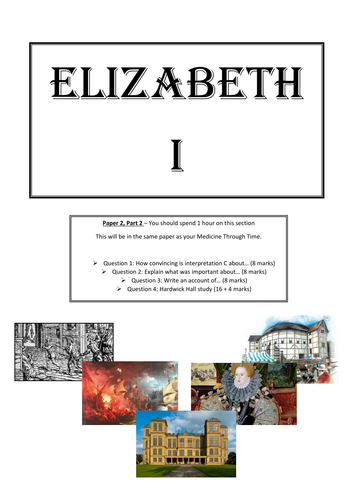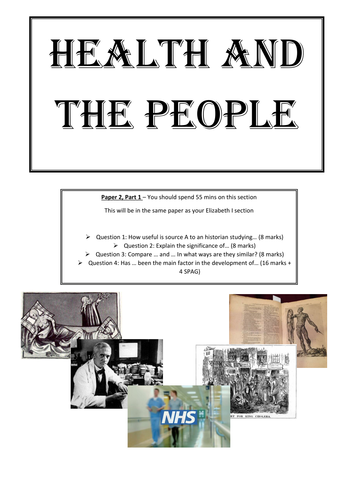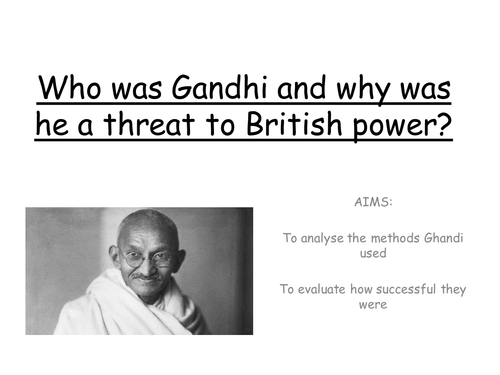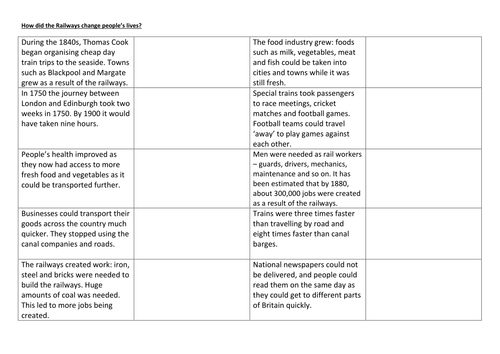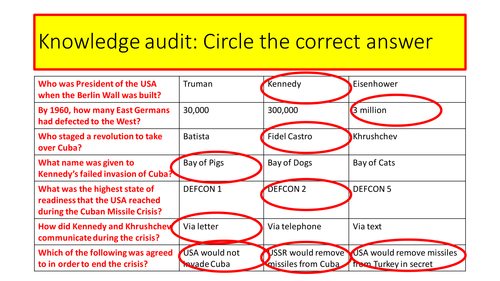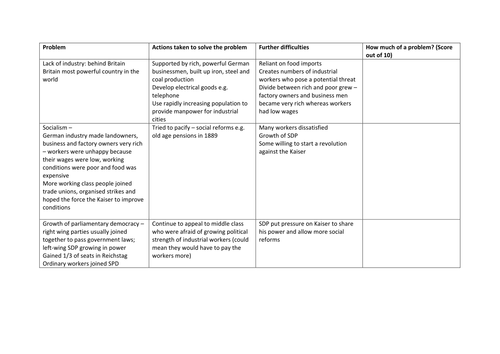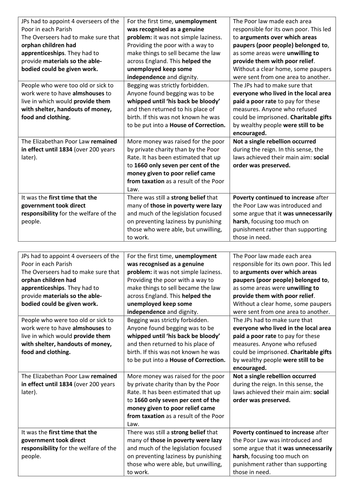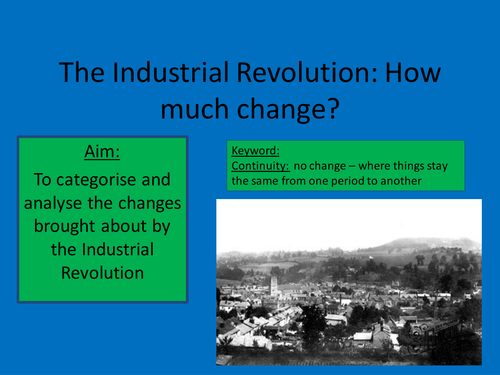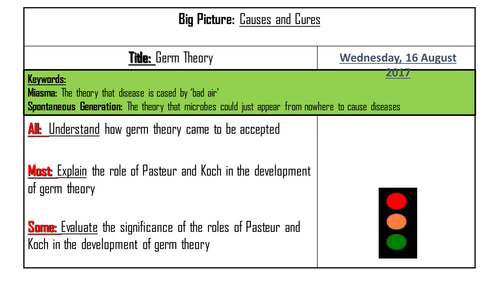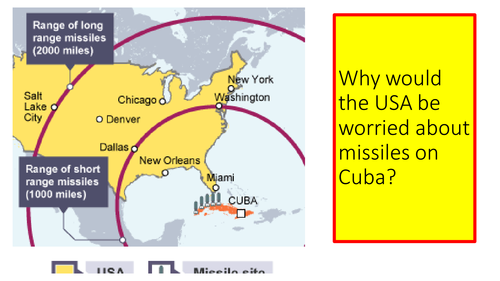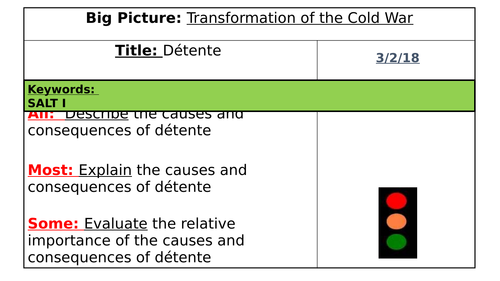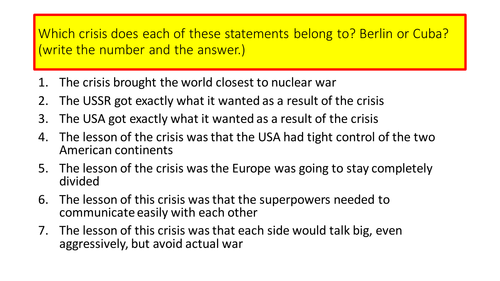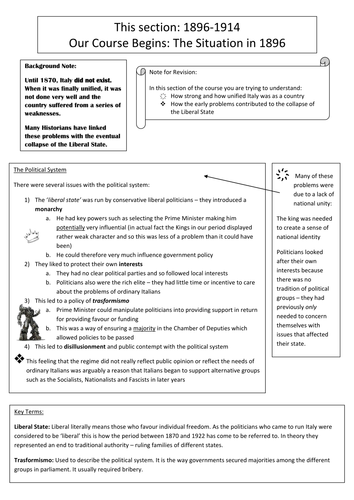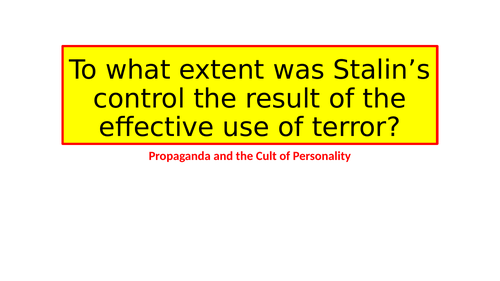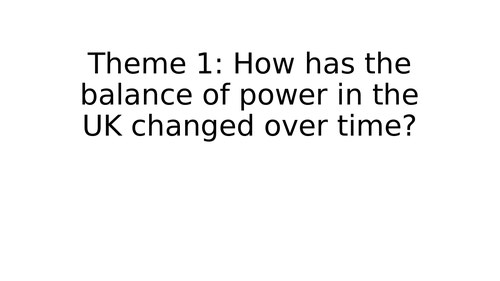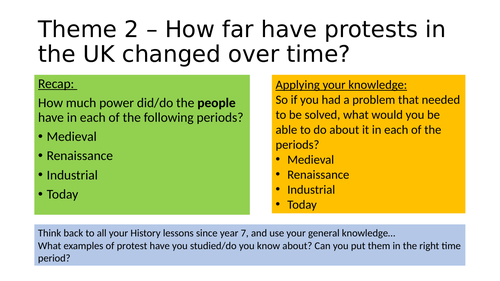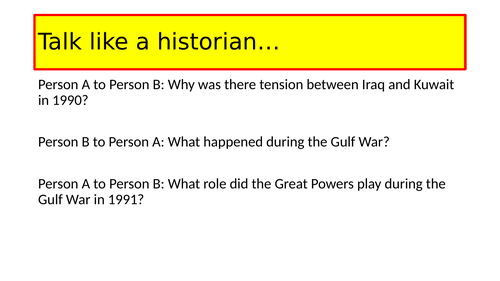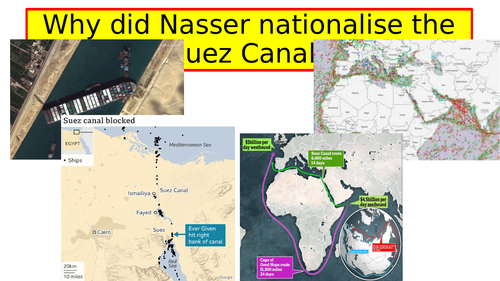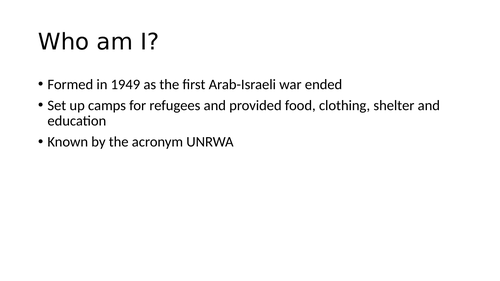
170Uploads
40k+Views
18k+Downloads

British Empire - Gandhi and Independence
A KS3 lesson in which students evaluate the methods used by Gandhi to protest against British rule. Students will reach a judgement about the most important reason why British rule was ended in India.

Industrial Revolution - Railways
A KS3 lesson in which students examine in the impact of the introduction of railways. Students will categorise consequences into social, economic and political impacts.

AQA 8145 Conflict and Tension: Cold War 1945-1972 - Consequences Cuban Missile Crisis
A GCSE lesson in which students examine the consequences of the Cuban Missile Crisis before reaching a judgement on who 'won' the crisis. Students will also prepare and then write a GCSE style 12 mark 'how useful' question. Includes differentiated preparation sheets and detailed guidance for students to use to complete their answer.

AQA 8145 Germany - Challenges to the Kaiser
Lesson 2 for AQA GCSE for Germany: Democracy and Dictatorship on the problems faced by the Kaiser during his rule. This lesson covers industrialisation, growth of socialism and rise of parliamentary democracy.

AQA 8145 Elizabeth I - 1601 Poor Law
A GCSE lesson for the unit on Elizabeth I focusing on the success of the 1601 Poor Law. This covers initial Elizabethan laws before studying the 1601 law in some depth.

Industrial Revolution - What changed?
This lesson works well as an introduction to the industrial revolution or a summary of the changes that take place. Students will categorise the changes and evaluate the extent of change. Includes differentiated resources for higher and lower ability students

AQA 8145 Medicine - Germ Theory
A GCSE lesson in which students will understand the chronology of the discovery of germ theory and its journey to finally becoming accepted. Students will also consider the roles of Pasteur and Koch in this process and reach a judgement on which individual was more significant. Also encourages students to consider the role of specific factors in line with the requirements of the 16 mark essay question.

AQA 8145 Conflict and Tension: Cold War 1945-1972 - Causes of the Cuban Missile Crisis
A GCSE lesson in which students examine the developing relationship between the USSR and Cuba, and the reasons for it. Students will explain how both the Cuban Revolution and the Bay of Pigs Invasion pushed Cuba closer to the Soviet Union, ultimately leading to missiles being sited there. Students will consider which event played a more significant role. Includes exam practice of a 4 mark source question with guidance.

AQA 8145 - Conflict and Tension Cold War - Detente
A GCSE lesson for the AQA specification in which students examine the barriers to detente, the reasons for detente and the consequences of the improving relationships. Links to a 16 mark exam essay question, as students will consider a variety of factors and reach a judgement on the most significant.

AQA 8145 Conflict and Tension - Cold War 1945-1972: Causes and Events of the Prague Spring
A GCSE lesson in which students will explain the causes of the Prague Spring and consider the reactions to Dubcek's reforms from a number of groups. Students will be encouraged to compare the crisis in Czechoslovakia to the Hungarian Uprising. Includes an exam style question and tips to help students answer.

Italy and Fascism Revision Guide A-level
A revision guide for A-level students on the topic of Italy and Fascism. The guide covers the course content while helping students to form analytical views around key questions for their exams.

Russia 1894-1941: Opposition to Nicholas II
An A-level lesson in which students evaluate the threat posed by the four main opposition groups to Nicholas II at the start of his rule. Students will use criteria such as popularity, how revolutionary, how united to reach an overall judgement on the significance of the threat each group posed, and will record their findings in top trumps cards to allow direct comparisons. Students can work in groups and teach each other, or independently. Students will finish by reaching a judgement on the group that posed the greatest threat, similar to the skills required in the short essay question.

Russia - 1905 Revoultion
An A-level lesson in which students examine the events of 1905. Students will create a living graph to show the anger felt by Russians, along with the level of threat posed to the Tsar. Students will examine evidence to conclude whether the events of 1905 deserve to be known as a revolution or not.

Russia 1894-1941: problem of Reform
An A-level lesson in which students must analyse the barriers to reform in Russia at the beginning of Tsar Nicholas II’s rule. Students will describe, explain and evaluate the significance of the barriers to reform to understand why little progress was made. This will form the foundation for understanding why there was significant opposition to Nicholas II. Students will ultimately reach a judgement on how well Nicholas was suited for the job, and the extent to which he can be blamed for the issues facing Russia.

Russia - Stalin's propaganda
An A-level lesson in which students assess the role of propaganda in Stalin’s consolidation of power. Students will consider the images of Stalin presented in propaganda, and its role in helping Stalin to consolidate his power. Having already studied economic policies and terror, students will draw links between propaganda and these other methods of consolidating power, to show how they are used in conjunction to strengthen Stalin’s position.

How has power changed over time?
A thematic double lesson in which students consider the nature of power and how it has changed over time. Students will consider key events which were significant in the development of the British political system, such as the Magna Carta, and will weigh up the balance of power at each point by considering the power of the monarchy, parliament and the people. Students will then have the opportunity to evaluate key events in more detail to get a better understanding of how political power was shaped by these events.
This lesson works well as a summary to KS3 learning so that students can draw conclusions from what they have been learning.

How have protests changed over time?
A thematic double lesson in which students consider how protests have changed over time. Students will consider the causes of protests, specifically economic and political, as well as the methods and response of the authorities.
Includes a double lesson carousel in which students will carry out a range of tasks for each time period: medieval, renaissance, industrial and modern. Students will draw conclusions by considering a series of statements about protests and deciding how much they agree with each.
This lesson works well as a summary at the end of KS3 where students can consider the periods and the key ideas and concepts from each.

1991 Gulf War
An A-level lesson in which students will evaluate the extent to which the aims of the Great powers were successfully achieved in the 1991 Gulf War. The lesson links to the first theme of OCR Y321 in which students consider the role of the Great Powers in the Middle East. Students will match the aims of the Great Powers to the methods and impact. Students will reach a judgement on the extent to which America could claim victory from the conflict. This will contribute to students’ ability to understand how successfully the Great Powers achieved their aims in the Middle East for their thematic essays.

Why did Nasser nationalise the Suez Canal?
An A-level lesson for OCR Y321 on the chain of events leading to the nationalisation of the Suez Canal. Students will understand the chronology and the competing aims of the Western powers versus Egypt.
Students will complete a chronology card sort and use these to understand the competing aims of Western powers and Egypt surrounding the Suez Canal. Students will explain attempts taken by Nasser to exert Egyptian independence and how they competed with Britain’s attempts to hold on to influence in the region. Students will finish by reaching a judgement on the motivations behind Nasser’s decision to nationalise the Suez Canal.

Israeli-Palestinian peace-making 1990s
An A-level lesson designed for OCR Y321 in which students will consider the factors influencing the successes and failures of the Israeli-Palestinian peace process in the 1990s. Students will use a card sort to put key events into chronological order to gain an understanding of the narrative. From this students will pick out the factors helping and hindering the peace process. The lesson is linked to the essay stem: ‘Zionism was the most important influence on attempts to resolve the Palestinian issue’ and will prepare how the 1990s supports and challenges this statement. Students are also given the opportunity to bring in their existing knowledge to consider how the factors at play in the 1990s were also apparent in the preceeding events so that they begin to draw comparisons and form a synthesis across the period as a whole.

